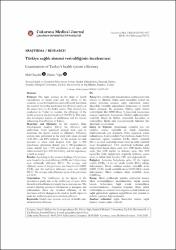| dc.contributor.author | Özçelik, Mail | |
| dc.contributor.author | Yiğit, Pakize | |
| dc.date.accessioned | 2020-10-30T07:07:57Z | |
| dc.date.available | 2020-10-30T07:07:57Z | |
| dc.date.issued | 2020 | en_US |
| dc.identifier.citation | Özçelik, M. ve Yiğit, P. (2020). Türkiye sağlık sistemi verimliliğinin incelenmesi. Çukurova Üniversitesi Tıp Fakültesi Dergisi, 45(3), 992-1017. https://dx.doi.org/10.17826/cumj.732772 | en_US |
| dc.identifier.issn | 2602-3032 | |
| dc.identifier.issn | 2602-3040 | |
| dc.identifier.uri | https://dx.doi.org/10.17826/cumj.732772 | |
| dc.identifier.uri | https://hdl.handle.net/20.500.12511/5989 | |
| dc.description.abstract | Amaç: Son yıllarda sağlık harcamalarına ayrılan payın hızla artması ve ülkelerin eldeki sınırlı kaynakları verimli bir şekilde kullanma çabaları, sağlık sektöründe makrodüzeydeki verimlilik çalışmalarını hızlandıran en önemli faktör olmuştur. Bu araştırma, Türkiye sağlık sistemi verimliliğinin iller (IBBS-Düzey 3) düzeyinde incelenmesi amacıyla yapılmıştır. Araştırmada, Türkiye sağlık sisteminin verimlilik düzeyi ile birlikte verimsizlik kaynakları ve verimsizlikle ilişkili olan sosyoekonomik faktörler iller düzeyinde incelenmiştir.Gereç ve Yöntem: Araştırmada verimlilik için verizarflama analizi, verimlilik ile ilişkili faktörlerin belirlenmesinde çok değişkenli Tobit regresyon analizikullanılmıştır. Girdi yönelimli Veri Zarflama Analiz (VZA)yöntemiyle toplam verimlilik (CCR), teknik verimlilik (BCC) ve ölçek verimliliği olmak üzere üç farklı verimlilik skoru hesaplanmıştır. VZA modelinde kullanılan girdi değişkenleri başına düşen yatak (her 1000 kişide), hekim sayısı (her 1000 kişide) ve hemşire sayısı (her 1000 kişide)’dır. Çıktı değişkenleri doğumda beklenen yaşam süresi ve bebek ölüm hızı (her 1000 canlı doğumda)’dır.Bulgular: Araştırma bulgularına göre, 10 ilin toplam verimli (CCR), 14 ilin ise teknik verimli (BCC) olduğu bulunmuştur. İllerin ortalama toplam verimlilik skoru0,8051 (CCR), teknik verimlilik skoru 0,8332 (BCC) olarak bulunmuştur. İllerin ortalama ölçek verimlilik skoru0,9649’dur.Sonuç: İllerin girdilerinde görülen verimsizlik kısmen ölçek verimsizliğinden kaynaklanırken, büyük oranda kaynak kullanımına bağlı teknik verimsizlikten kaynaklanmaktadır. Araştırma bulguları, illerin teknik verimliliğine ve verimsiz illeri nispeten verimli kılmak içinsağlık girdilerinde yapılacak değişikliklere dair yönetici ve politika yapıcılara bilgi sunmuştur | en_US |
| dc.description.abstract | Purpose: The rapid increase in the share of health expenditures in recent years and the efforts of the countries to use the limited resources efficiently have been the essential factor that accelerated the efficiency studies at the macro level in the health sector. This research was conducted to Turkey to examine the efficiency of the health system at the provincial level (NUTS-3). This study also investigates sources of inefficiency and the factors influencing that efficiency in Turkey.Materials and Methods: In the research, Data Envelopment Analysis (DEA) for efficiency and multivariate Tobit regression analysis were used to determine the factors related to efficiency. Efficiency analysis were performed in the study with input-oriented CCR, BCC and RTS methods. In the analysis for each province is taken total hospital beds (per 1 000 population), physicians density (per 1 000 population), nurses density (per 1 000 population) as an input and infant mortality (per 1000 live births), and life expectancy at birth as output.Results: According to the research findings, 10 provinces were found to be total efficiency (CCR) and 14 provinces were technically efficiency (BCC). The average total efficiency score of the provinces was found to be 0.8051 (CCR), and the technical efficiency score was 0.8332 0,8332 is 0.9649.Conclusion: The inefficiency in the inputs of the provinces is partly due to the inefficiency of scale, while the technical inefficiency is largely due to resource use. The research findings provided information to managers and policymakers about the technical efficiency of the provinces and the changes to be made in health inputs to make the inefficient provinces relatively efficient. | en_US |
| dc.language.iso | tur | en_US |
| dc.publisher | Çukurova Üniversitesi | en_US |
| dc.rights | info:eu-repo/semantics/openAccess | en_US |
| dc.subject | Sağlık Hizmetleri Sistemi | en_US |
| dc.subject | Sağlık Hizmeti Sunumu | en_US |
| dc.subject | İdari Verimlilik | en_US |
| dc.subject | Health Care Systems | en_US |
| dc.subject | Delivery of Health Care | en_US |
| dc.subject | Administrative Efficiency | en_US |
| dc.title | Türkiye sağlık sistemi verimliliğinin incelenmesi | en_US |
| dc.title.alternative | Examination of Turkey's health system efficiency | en_US |
| dc.type | article | en_US |
| dc.relation.ispartof | Çukurova Üniversitesi Tıp Fakültesi Dergisi | en_US |
| dc.department | İstanbul Medipol Üniversitesi, Tıp Fakültesi, Temel Tıp Bilimleri Bölümü, Biyoistatistik ve Tıp Bilişimi Ana Bilim Dalı | en_US |
| dc.authorid | 0000-0002-5919-1986 | en_US |
| dc.identifier.volume | 45 | en_US |
| dc.identifier.issue | 3 | en_US |
| dc.identifier.startpage | 992 | en_US |
| dc.identifier.endpage | 1017 | en_US |
| dc.relation.publicationcategory | Makale - Uluslararası Hakemli Dergi - Kurum Öğretim Elemanı | en_US |
| dc.identifier.doi | 10.17826/cumj.732772 | en_US |
| dc.identifier.trdizinid | TkRjeU5UQXhNUT09 | en_US |


















